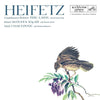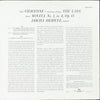



Jascha Heifetz - The Lark (Mono)
Jascha Heifetz - Violin
Richard Ellsasser – Organ (A1)
Emanuel Bay – Piano (A2)
Brooks Smith - Piano (B1)
1LP, standard sleeve with full-color insert
Original analog Master tape : YES
Heavy Press : 180g High-Quality Audiophile Vinyl
Record color : black
Speed : 33RPM
Size : 12”
Mono
Studio
Record Press : RTI
Label : Impex Records
Original Label : RCA
Recorded at Bridges Hall of Music, Pomona College, Claremont, California on Aug 4, 1950 (A1) ; Dec 1, 1953 & Mar 30, 1954 (A2) ; Dec 15 & 16, 1955 (B1)
Mastered by Bernie Grundman at Bernie Grundman Mastering
Liner notes by Charles L. Granata
Originally released in 1957
Reissued in 2024
Tracks:
Side A:
- Tomaso Antonio Vitali - Chaconne
- Mario Castelnuovo-Tedesco (1895-1968) - The Lark (Poem in the form of a Rondo)
Side B:
- Gabriel Fauré - Sonata No. 1, In A, 0p. 13 with Brooks Smith at the Piano
Reviews :
“There are far too few classical vinyl reissues released these days so it is with great pleasure I bring you a review of Impex’s new reissue of a Jascha Heifetz masterpiece, The Lark. Impex Records’ head Abey Fonn deserves special thanks for painstakingly bringing back not only an RCA classic but in the original mono.
If you know Impex’s products, you appreciate the care they take with both the pressings and jackets. And no matter the genre, the remastering is always done with the best engineers. Here we have Bernie Grundman cutting from a 1-to-1 flat transfer of the original analog master tapes. The Lark is pressed on an all-analog LP for the first time in almost 50 years and on RTI’s HQ-180 vinyl.
(…) Jascha Heifetz (1901-1987) was entering his 50s when he recorded The Lark and at the height of his powers. His intense tone (described as a “tornado”) and flawless technique (regarded as the greatest since Paganini) made his records best sellers and the artist a fortune.
Although Heifetz is famed for his recordings of the great Central European concerto repertoire, he was not averse to recording smaller, more intimate works of various styles, including solo works, sonatas and chamber music. The Lark is an especially fine example of this type of intimate, eclectic repertoire.
Mixing and matching Tomaso Antonio Vitali’s “Chaconne in g minor for Violin and Continuo”, a classic of the Baroque period (although there is some discussion of its provenance) with the late Romantic “Violin Sonata No. 1 in A Major, Op. 13” by French composer Gabriel Fauré (1845–1924) and Mario Castelnuovo-Tedesco’s “The Lark: Poem for Violin and Piano” (a 20th-century modern tone poem) is adventurous programming. Here accomplished by the amazing musical skill of Heifetz and his ability to weave and connect the different styles. He is accompanied by very sympathetic collaborative artists.
It’s no surprise that Heifetz can play all the works in his sleep, one-handed. But the recording captures his wonderful musicality in concert with his intense tone and perfect technique. So, even though a mono recording, the original engineers were able to record the essence of a Heifetz recital. Do not let the mono put you off. I find more often than not, smaller-scale works and solo and chamber groups sound more immersive when recorded in mono. It certainly is the case here.
It’s often written about John Coltrane’s “sheets of sound”; the same may be written of Heifetz. He preferred his Guarnari violin miked very close. This recording is a perfect example of the tornado, the torrents of perfectly vibrated sound. It’s an overwhelming experience. And when the music requires subtlety, Heifetz’s exquisite musicianship is there with nothing lost because of the super accurate recut.
The Vitali “Chaconne” uses Respighi’s arrangement with organ accompaniment. It’s very effective in highlighting Heifetz’s dramatic presentation.
Next on Side 1, we jump a couple of centuries to “The Lark”. A lovely piece with Heifetz emphasizing the delicate nature of the subject. It’s one more example of his exemplary bow control. Listen to the opening trills, the control and the dynamic shading.
Side 2 brings us the meat of the program, an exceptionally assured, passionate performance of Fauré‘s “1st Sonata” (1875). Now so famous for its elegance and beauty, but dispatched without publication at the time by every French publisher.
Heifetz holds back when Fauré requires and then sings above Brooks Smith’s superb piano accompaniment when the line gets intense. At the famous Scherzo, we hear Heifetz’s venerated quicksilver bow work with articulation that is head-shaking in its accuracy.
As for the recording, an artistic triumph for all involved; Bernie Grundman mastered and cut the record, Impex producer Bob Donnelly oversaw the project, with Andreas Meyer restoring the tape and Abey Fonn as Executive Producer. For a bonus, an excellent, lengthy analysis by Charles L. Granata is included with photos. It takes a village!
The surfaces are silent so the full impact of the Heifetz sound is heard from bar 1. By the final bar of the Vitali, after Heifetz has had his way with you, if you are not completely emotionally wrung out, well, I don’t know!” Audiophilia Review by Anthony Kershaw
Ratings:
Discogs : 4.8 / 5


